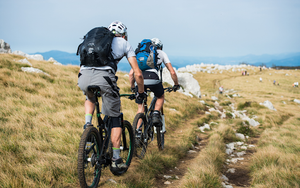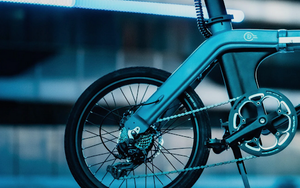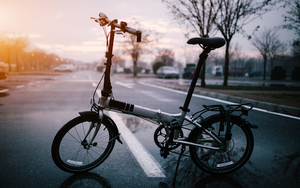Can Electric Scooters Go Uphill?
Nov 14, 2023
When it comes to conquering uphill slopes, electric scooters need to combine power, weight management, and traction. Let's delve into the mechanics that determine whether electric scooters can go uphill and how they perform on inclines.
List of Contents
- Can electric scooters go uphill?
- Understanding electric scooter mechanics
- Factors affecting an electric scooter’s hill-climbing ability
- Tips to improve uphill performance on electric scooters
- Common misconceptions about electric scooters and hills
- Electric scooter statistics
- Conclusion
Understanding Electric Scooter Mechanics
Electric scooters have become increasingly popular as a convenient and eco-friendly mode of transportation. With advancements in technology, these scooters have evolved to offer impressive uphill capabilities, allowing riders to tackle even the steepest of hills with ease.
The Role of Motor Power in Climbing Hills
Motor power plays a crucial role in an electric scooter's ability to tackle uphill terrains. The higher the motor power, the better the scooter's climbing performance. Most electric scooters feature motors with power ranging from 250 to 1000 Watts.
For example, the popular E-Dash LE1 Electric Scooter boasts a powerful 350-Watt motor, allowing it to tackle inclines of up to 20 degrees with ease. This demonstrates how motor power significantly affects an electric scooter's uphill capabilities.
Additionally, advanced motor technologies, such as brushless motors, contribute to improved efficiency and power delivery, further enhancing the scooter's climbing abilities.

Importance of Scooter Weight and Rider Weight
Weight distribution is another crucial factor affecting an electric scooter's uphill performance. Both the scooter's weight and the rider's weight impact how well it can climb hills. Heavier scooters might struggle more on inclines, while lighter ones will have an advantage.
Take the Kugoo G2 Pro electric scooter, for instance. With a weight of 23kg, it's built to easily tackle steep hills. Additionally, riders with lighter weight can optimise their scooter's uphill performance.
Furthermore, manufacturers are constantly exploring innovative materials and design techniques to reduce the weight of electric scooters without compromising on durability and structural integrity. This continuous improvement in weight management contributes to enhanced uphill capabilities.
The Impact of Wheel Size and Traction
Wheel size and traction significantly affect an electric scooter's uphill grip and stability. Scooters with larger wheels tend to perform better on hills, as they provide better traction and handle rough terrains more effectively.
An example of an electric scooter renowned for its excellent uphill traction is the Ienyrid M4Pro electric scooter. Equipped with 10-inch air-filled tyres, it maintains superb grip even on challenging uphill surfaces.
In addition to wheel size, the type of tyre and its tread pattern also play a crucial role in uphill performance. Some electric scooters feature specialised off-road tyres with aggressive tread patterns, designed to provide maximum traction on various surfaces, including steep inclines.

Moreover, advancements in suspension systems, such as front and rear shock absorbers, contribute to improved stability and control while climbing hills. These suspension components help to absorb impacts and maintain optimal tyre contact with the ground, ensuring a smooth and confident uphill ride.
As the demand for electric scooters continues to grow, manufacturers are investing in research and development to further enhance their uphill capabilities. Through the integration of advanced technologies and innovative design features, electric scooters are becoming increasingly efficient and powerful, making uphill rides a breeze.
Factors Affecting an Electric Scooter's Hill-Climbing Ability
Steepness and Length of the Hill
The steepness and length of the hill directly impact an electric scooter's uphill performance. Steeper slopes necessitate scooters with higher motor power and better traction. The length of the hill affects battery consumption and overall riding comfort.
For instance, climbing a short, steep hill with a 10% grade might be more manageable for an electric scooter with a 350-Watt motor compared to a 250-Watt motor.
Battery Life and Hill Climbing
The battery life of an electric scooter plays a pivotal role in uphill climbing. Steep inclines require more power from the battery, meaning the scooter's range might decrease. It's crucial to choose an electric scooter with sufficient battery capacity for your hill-climbing needs.
The Inokim OXO Electric Scooter offers a 60V 25.6Ah battery that can conquer harsh inclines and offers a range of approximately 66 miles when fully charged.
Terrain Type and Its Influence
The type of terrain also affects an electric scooter's uphill performance. Smooth pavements are easier to traverse compared to gravel or dirt paths. The traction provided by the scooter's tyres plays a critical role in managing various terrains.

Tips to Improve Uphill Performance on Electric Scooters
Maintaining Your Scooter's Battery Health
Proper battery maintenance is essential for optimal uphill performance. Regularly charging your scooter and avoiding complete discharges will help keep the battery healthy. Additionally, storing the scooter in a cool and dry environment will extend the battery's lifespan.
Choosing the Right Scooter for Your Environment
Consider the terrain in your environment when selecting an electric scooter. If you frequently encounter steep hills, choose a scooter with a powerful motor and larger wheels for enhanced climbing capabilities.
Techniques for Riding Uphill on an Electric Scooter
Mastering proper riding techniques is crucial when tackling uphill slopes. Distribute your weight evenly on the scooter, lean forward slightly, and maintain a steady speed to optimise traction and stability. Gradually increase or decrease your speed based on the slope's difficulty.

Common Misconceptions About Electric Scooters and Hills
Debunking the Myth of Limited Power
One common misconception is that electric scooters lack the power to effectively climb hills. However, with advancements in technology, many electric scooters can conquer steep inclines with ease. Electric scooters boasting high motor power and proper weight distribution can tackle even the most challenging hills.
Addressing Concerns About Battery Drain
Some worry that climbing hills significantly drains an electric scooter's battery. While it's true that uphill riding requires more power, modern scooters are designed to handle this demand efficiently. It's crucial to choose an electric scooter with a battery capacity suitable for your hill-climbing needs.
Clarifying Misunderstandings About Scooter Durability
Another common misconception is that electric scooters might not withstand the demanding nature of uphill riding. However, reputable manufacturers extensively test their scooters to ensure durability and reliability. By choosing a scooter with quality build materials, you can confidently conquer hills without worrying about durability issues.

Electric Scooter Statistics
- 82% of people who thought they would buy or hire an e-scooter anticipated that they would reduce or stop using at least one mode of transport.
- Within a recent survey, the most commonly percieved advantage of e-scooters was reduced pollution and them being better for the environment, mentioned by 24% of respondents.
Conclusion
When it comes to conquering uphill slopes, electric scooters have come a long way. Understanding the mechanics, vital factors, and debunking misconceptions can help you make informed decisions about choosing the right electric scooter and optimising its uphill performance. With the right scooter and riding techniques, tackling hills becomes an enjoyable and effortless experience.






